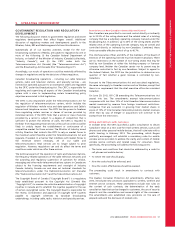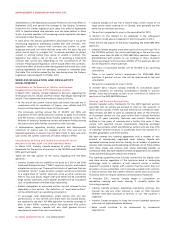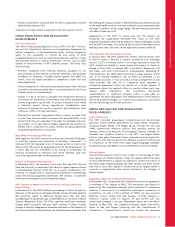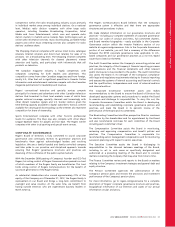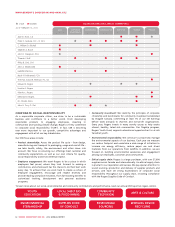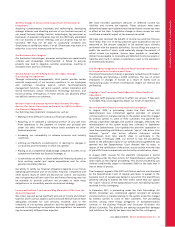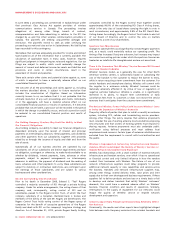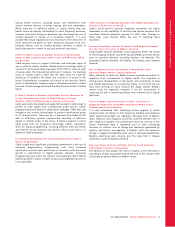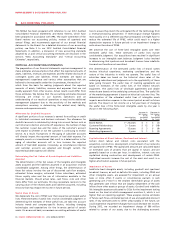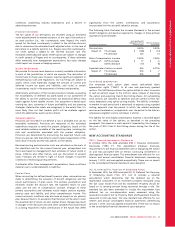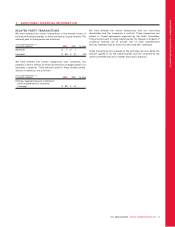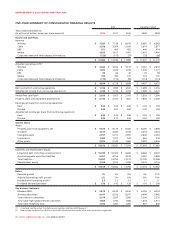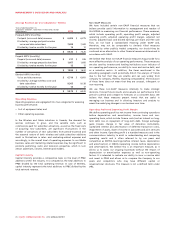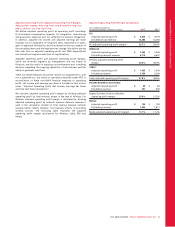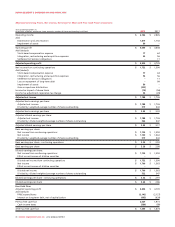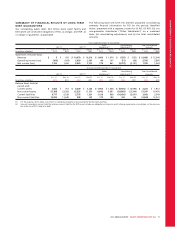Rogers 2012 Annual Report Download - page 71
Download and view the complete annual report
Please find page 71 of the 2012 Rogers annual report below. You can navigate through the pages in the report by either clicking on the pages listed below, or by using the keyword search tool below to find specific information within the annual report.
MANAGEMENT’S DISCUSSION AND ANALYSIS
various health concerns, including cancer, and interference with
various medical devices, including hearing aids and pacemakers.
While there are no definitive reports or studies stating that such
health issues are directly attributable to radio frequency emissions,
concerns over radio frequency emissions may discourage the use of
wireless handsets or expose us to potential litigation. It is also
possible that future regulatory actions may result in the imposition of
more restrictive standards on radio frequency emissions from low-
powered devices, such as wireless handsets. Wireless is unable to
predict the nature or extent of any such potential restrictions.
Failure to Obtain Access to Support Structures and Municipal
Rights of Way Could Increase Cable’s Costs and Adversely Affect
Our Business
Cable requires access to support structures and municipal rights of
way in order to deploy facilities. Where access to municipal rights of
way cannot be secured, Cable may apply to the CRTC to obtain a right
of access under the Telecommunications Act. However, the Supreme
Court of Canada ruled in 2003 that the CRTC does not have the
jurisdiction to establish the terms and conditions of access to the
poles of hydroelectric companies. As a result of this decision, Cable’s
access to hydroelectric company poles is obtained pursuant to orders
from the Ontario Energy Board and the New Brunswick Public Utilities
Board.
If Cable Is Unable to Maintain Sustainable Security Measures to
Prevent Unauthorized Access to Digital Boxes or Internet
Modems, Cable Could Experience a Decline in Revenues
Cable uses vendor developed and supported encryption technology to
protect its cable signals from unauthorized access and to control
programming access based on subscription packages. Cable also uses
encryption and security technologies to prevent unauthorized access
to its Internet service. There can be no assurance that Cable will be
able to effectively prevent unauthorized decoding of television
signals or Internet access in the future. If Cable is unable to control
cable access with our encryption technology, Cable’s subscription
levels for digital programming, including premium VOD and SVOD,
and Internet service revenues may decline, which could result in a
decline in Cable’s revenues.
Increasing Programming Costs Could Adversely Affect Cable’s
Results of Operations
Cable’s single most significant purchasing commitment is the cost of
acquiring programming. Programming costs have increased
significantly in recent years, particularly in connection with the recent
growth in subscriptions to digital specialty channels. Increasing
programming costs within the industry could adversely affect Cable’s
operating results if Cable is unable to pass such programming costs on
to its subscribers.
Cable’s Business Telephony Operations Are Highly Dependent on
Facilities and Services of the ILECs
Cable’s out-of-territory business telephony operations are highly
dependent on the availability of facilities and services acquired from
incumbent telecom operators, pursuant to CRTC rules. Changes to
these rules could severely affect the cost of operating these
businesses.
Pressures Regarding Channel Placement Could Negatively Impact
the Tier Status of Certain of Media’s Channels
Unfavourable channel placement could negatively affect the results
of The Shopping Channel, Sportsnet, SportsnetONE, Sportsnet World,
and our specialty channels, including Outdoor Life Network, The
Biography Channel (Canada), G4 Canada, FX (Canada), and CityNews
Channel.
Risk of Migrating from Conventional to New Media Could
Adversely Impact Media’s Operating Results
Many industries in which our Media business operates are subject to
migration from conventional to digital media. This migration is
driving major developments in the quality and accessibility of data
and mobile alternatives to conventional media. To limit this risk, we
have been shifting our focus towards the digital market. Media’s
results could be negatively impacted if we are unsuccessful in
capturing the shift in advertising dollars from conventional to digital
platforms.
A Loss in Media’s Market Position in Radio, Television or
Magazine Readership Could Adversely Impact Media’s Sales
Volumes and Advertising Rates
It is well established that advertising dollars migrate to media
properties that are leaders in their respective markets and categories
when advertising budgets are tightened. Although most of Media’s
radio, television and magazine properties currently perform well in
their respective markets, such performance may not continue in the
future. Advertisers base a substantial part of their purchasing
decisions on statistics such as ratings and readership generated by
industry associations and agencies. If Media’s radio and television
ratings or magazine readership levels were to decrease substantially,
Media’s advertising sales volumes and the rates that it charges
advertisers could be adversely affected.
Blue Jays Player Contract and Other Activity Could Adversely
Affect Media’s Results of Operations
The addition of new players, the injury of players, or the termination
and release of Blue Jays players before the end of the contract term
could have an adverse effect on Media’s results.
2012 ANNUAL REPORT ROGERS COMMUNICATIONS INC. 67


